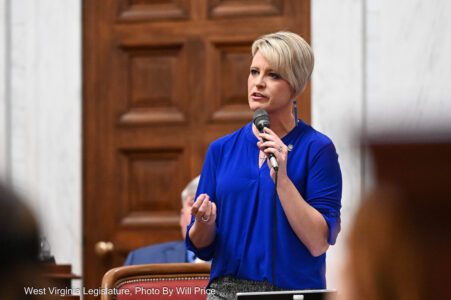‘In God We Trust’ Classroom Mandate Passes West Virginia Senate

Photo courtesy of WV Legislative Photography State Senate Education Committee Chairwoman Amy Grady said requiring signage in every public school and college classroom stating “In God We Trust” was not a religious statement.
CHARLESTON – The West Virginia Legislature is focusing on the first 15 days of the 60-day session on bills aimed at appealing to social conservatives concerned with public schools and libraries.
The West Virginia Senate easily passed bills Tuesday requiring schools to display “In God We Trust” in every classroom and further allowing the discussion of intelligent design in public schools.
The bills were recommended for passage last week by the Senate Education Committee, which also recommended a bill Tuesday to allow the showing of a video to public school students from an anti-abortion political advocacy organization.
Senate Bill 152, allowing for the display of the U.S. motto in public schools, passed Tuesday morning in a 31-1 vote with state Sen. Mike Caputo, D-Marion, the lone nay vote. The bill now heads to the House of Delegates. The bill’s lead sponsor is state Sen. Mike Azinger, R-Wood.
A committee substitute for the bill adopted by the Senate Education Committee requires public elementary and secondary schools and public colleges and universities to display “In God We Trust” in every classroom, either as a poster or a framed copy if the display is donated or paid for with private donations. The display must include an American flag.
“In God We Trust” became the national motto in 1956 in a law signed by President Dwight Eisenhower, changing from “E Pluribus Unum.” “In God We Trust” was reaffirmed by Congress as the U.S. motto in 2011.
“A lot of times that is interpreted as a religious statement, but it’s not,” said Senate Education Committee Chairwoman Amy Grady, R-Putnam. “It has been challenged in court on several occasions and it has always come across that it is constitutional. It’s printed on the back of every coin. I have a dollar bill; turn it over and guess what it says? ‘In God We Trust.'”
“If ‘In God We Trust’ is a religious sentiment and shouldn’t be in schools, what do we use to fund our schools? Dollar bills,” Grady continued. “If we’re going to remove the motto of the United States of America from our classrooms, should we consider removing the funding as well? We’d get in a lot of trouble then, wouldn’t we?”
Caputo questioned Grady about the bill’s provisions requiring “In God We Trust” in every single public school, college, and university classroom.
“You can’t just do one classroom,” Caputo said. “If you do it, you have to do it in every classroom. That could be, in my eyes, very burdensome for the institution.”
Caputo also raised concerns about the lack of language in the bill allowing schools to reject donations for “In God We Trust” signs in the instance that a controversial group would offer to sponsor the signage. Grady said schools would have discretion on what donations to accept or reject.
“What concerns me … is what if some hate group says ‘I want to donate all these to Elkview Elementary School’ and let’s say it’s the KKK for lack of a better term, there is nothing in here from what I read … that would restrict them from donating that,” Caputo said. “It would be common knowledge who would donate that, and that – in my opinion – would be very hurtful and troublesome.”
Senate Bill 280, allowing teachers in public schools to discuss scientific theories, passed the Senate in a 31-2 vote, heading to the House. Caputo and Senate Minority Leader Mike Woelfel, D-Cabell, voted against the bill.
Under the committee substitute adopted by the Senate Education Committee last week, the bill prohibits county school boards, superintendent or principals from preventing teachers from discussing or answering questions from students about scientific theories about how the universe and/or life came to exist.
Grady, the bill’s lead sponsor, said SB 280 was not a backdoor to allow the teaching of intelligent design – sometimes called a pseudoscientific theory by opponents – that holds that the universe and life was created with a purpose by an entity and not through random causes, such as the Big Bang Theory or evolution.
“Often the discussion is turned to intelligent design and that’s not what the bill is about,” Grady said. “The bill is about encouraging our students to think, encouraging our students to ask questions, and encouraging our teachers to be able to answer them.”
Federal courts ruled nearly 20 years ago that the teaching of intelligent design in classrooms was unconstitutional, with it too closely resembling creationism, the Christian belief that the universe and life was created by God in six days while resting on the seventh day. Woelfel, a practicing Catholic, said SB 280 could open the state up to litigation and said the bill was intentionally vague.
“I personally don’t have a problem with it and the beliefs that are sincerely held in this chamber,” Woelfel said. “What I do have a problem with is the Constitution, which says if you have a bill, it has to be specific. It can’t be vague. People have to know what the bill says so they can follow the bill … I believe a court will hold this bill to be unconstitutional.”
Earlier Tuesday morning, the Senate Education Committee adopted a committee substitute for Senate Bill 468, requiring a course in public schools on human development. The bill would create the Baby Olivia Act, requiring the teaching in the eighth grade and 10th grade in public and charter schools of courses in pregnancy and human development in the womb.
Students would be required to view an ultrasound video showing the development of early fetal development, as well as a video, titled “Meet Baby Olivia,” created by Live Action, a anti-abortion pro-life political advocacy group known for its undercover videos within Planned Parenthood facilities. Committee members were shown the video during the meeting.
Questions about the bill focused on whether the Legislature could mandate the viewing of a specific video from a specific group versus allowing the school system to select the type of video or educational materials.
“We have all these processes in place, I think, for the selection of textbooks and curriculum and that sort of thing,” said Senate Judiciary Committee Chairman Charles Trump, R-Morgan. “This appears to be, for me anyway from my limited knowledge, different or unique in that it is dictating the provider of the curriculum for the subject.”
The House Judiciary Committee will have a public hearing today on House Bill 4654, which would lift criminal liability exemptions from schools in the presentation of local or state-approved curriculum; or public libraries and museums displaying obscene matter to a minor when the child is accompanied by a parent/guardian.
And a public hearing has been requested on a bill being considered today by the House Education Committee. House Bill 4806 would require bathroom use in schools based upon biological sex. The bill is on the House Education Committee agenda for 2 p.m.






